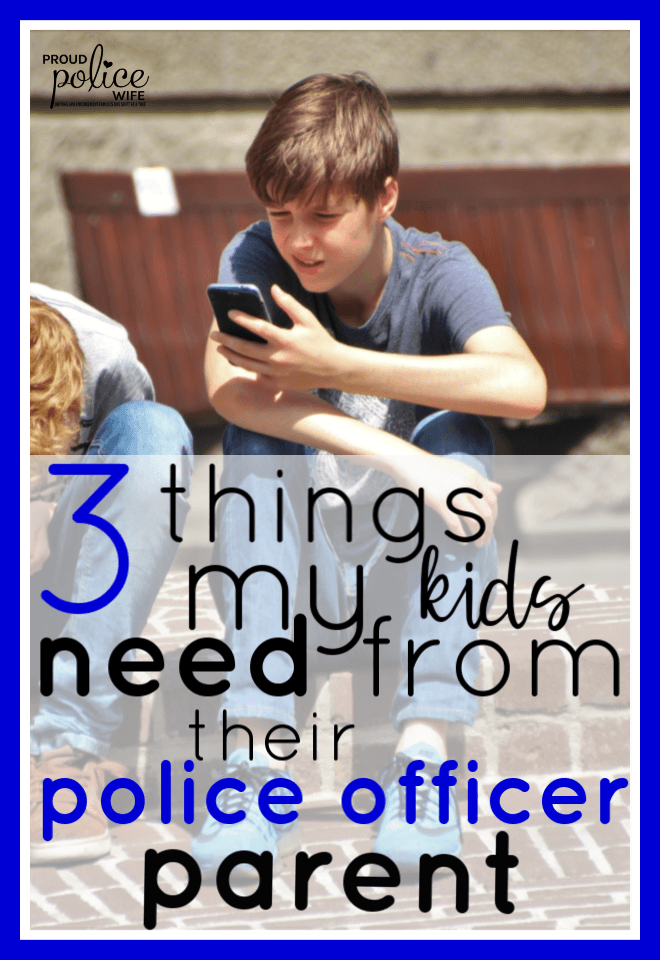
With three young children and one now in elementary school, my husband and I have had to adjust to their needs throughout the years (and each child has different needs). The needs I am referring to in this post are what our kids need regarding life as children of a police officer and how we parent to these specific needs.
This lifestyle brings many unique situations, and ones that they don’t see their friends or even close family going through. So whether your kids are toddlers, school-aged or teenagers, we have to pay close attention to how they may be feeling (or acting) when they miss a police officer parent, feel disconnected or are struggling with a situation regarding his/her job.
We want to help our children navigate this lifestyle just as we would if we were say, a military family. But as parents, we may need a little help with this topic, too.
So without further ado…
Here are three tips that can help your kids (at any age!) and the police officer in your family stay connected:
1.Communication. We always hear the phrase “communication is key” but it couldn’t be more true. Kids need to be feel connected to their parents no matter how much or little they are physically with them on a daily basis. How they connect will vary with age but regardless, they still need it.
This may mean phone calls during the day, Facetime, Skype or my personal favorite- The Marco Polo App (think video walkie-talkies). Hand-written notes, calendars, schedules and planning as a family, all help with communication.
As the police officer (or even the spouse), it is very helpful to let your children know what your week or day will look like as a family. My kids personally have a hard time if they have to go days without seeing their daddy, which is absolutely expected for anyone of any age. So we try to break up those long days apart as best as we can. It may mean, a dinner date with dad in a parking lot, snuggle time before school starts, leaving each other pictures and notes around the house as a surprise to brighten their days.
We watch old videos that are saved on our Marco Polo app of my husband saying “I love you” and leaving other sweet messages. If your children are young, having the officer prerecord a bedtime story could also be helpful.
At different ages, your children may also begin to ask questions about what it means to be a police officer. Does it involve risk? Is it dangerous? They may even have some resentment towards the job. All of these things can and should be talked about to calm any fears (which are absolutely normal) your children may have. When the officer of your family is home, try to have time to just talk and reconnect and answer any questions your children may have.
2. Involvement. It is super important that your officer feel involved in the family plans even if they can’t be with you physically. In addition, it is important that you INCLUDE the officer in your family as best as you can even if they are working.
This may look like: taking pictures or videos of the kids at an event so your officer can still feel connected or maybe just waiting to make new, memorable plans until your officer is home. While we can’t always wait for our spouse to be off to plan things, it is nice to include him/her in the discussion and save really important events or “fun” activities for when they are off.
Grab the All-in-One Police Wife Reference Guide

Grab this handy reference guide for all things police wife! From important dates & events to resources for law enforcement- all in one place! Subscribing also gets you access to my weekly newsletter full of tips and encouragement.
Read my PRIVACY POLICY here.
3. Understanding. As parents (spouse and officer), it is important to remember that when our kids are struggling with missing a parent or wondering about the fears of the job, they need reassurance. We have to understand that their feelings need to be acknowledged.
It is important for us to check in with them every now and then, especially if they are older. Also, their fears, worries, sadness, may often be displayed in other ways like frustration, withdrawal, etc. Checking in and having discussions about how they are doing, feeling, etc can help give clarity about how they are feeling on a day to day basis.
If your children are younger, books can help explain what your spouse does.
Here are a few of my favorite books for law enforcement children:
-A Hero Lives in my Family: A Story for Kids of First Responders by Dr. Susan Hunt
-Police: Hurrying, Helping, Saving! by Patricia Hubbell
These books are more for younger children. Unfortunately, books for young adults are seriously lacking.
Raising kids can be tough these days. So to help them navigate law enforcement life a bit easier, remember to: communicate, stay involved and have understanding. You got this!

FREE Police Wife Guide- Top 10 Ways to Rock Police Wife Life
Learn to rock police wife life with these 10 easy tips! Join over 20,000 fellow police wives who are learning to rock it and feel supported with our help each week! Once a week I will provide you with even more ways to feel encouraged and supported for your law enforcement wife journey with my newsletter.
Read my PRIVACY POLICY here.

